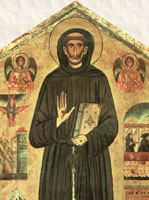The line between saintlihood and madness has rarely been thinner than in the case of St Francis of Assissi. By all accounts a spoiled and carefree youth, his life was changed by a year as a prisoner of war in Perugia and two bouts of serious illness. Losing his desire for military glory, he began to experience portentous dreams, and eventually direct communications from God.
Most of these communications he interpreted as demanding ever more spectacular feats of impulsive charity and self-inflicted poverty, for which he was generally mocked by the populace at large. As time went by, he began to organise his ideas into a 'rule of life', and preached this rule with sufficient charisma to convert others. This following would eventually form the Franciscan Order of monks.
Whether it was preaching to the birds, converting the Saracens to Christianity, or reforming the medieval Church, Francis seemed to have a special affinity for absurdly difficult challenges. Yet where many radicals with similar ideas had been condemned as heretics, Francis eventually conquered the doubts of the Vatican, and his ideas spread with unparalleled rapidity.
Francis' legendary self-abasement and humility were central to his reputation for holiness. He not only preached and practised absolute poverty, but seemed almost to glory in seeking humiliation in the service of the Lord.
A small number of Francis' own writings survive, and his Life was documented with surprising thoroughness by a number of contemporary biographers. Most importantly, his Rule and the orders he established still thrive today.
By the time Francis died, he was already revered by clergy and lay people alike. When it became obvious that his health was failing, he set out for his home of Assissi, but had to take a roundabout route for fear of kidnap, as the future worth of his relics was already all too apparent to the citizens of neighbouring states. He eventually died at Porzioncula, near Assissi, where Christ had first appeared to him and set him on his chosen path.
Surprisingly, not all clergy have been converted to Francis' ideal of a life of absolute poverty, but there are still many people today who seek to follow Francis' Rule, both within and outside the Catholic Church. He is, arguably, responsible for a change in Western attitudes to animals.














